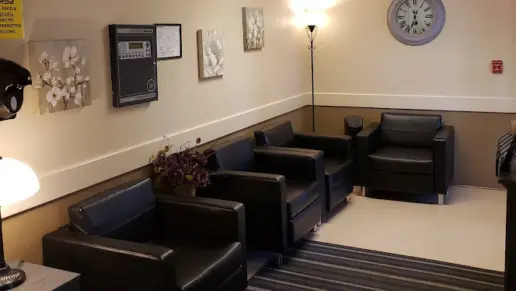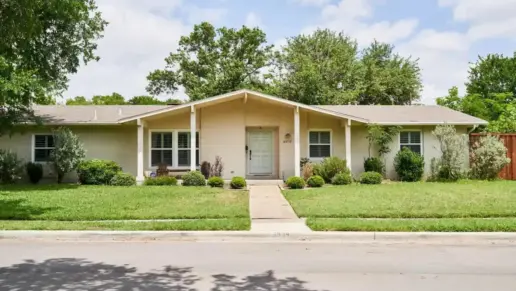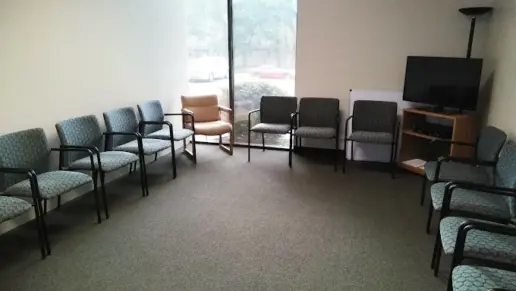Serenity house saved my wife and my life.
About Serenity House
Serenity House in Abilene, Texas, offers comprehensive addiction recovery services for adults, including medically supervised detox and inpatient, outpatient, and aftercare services. They also specialize in dual diagnosis care, young adult programs, and youth prevention. Primary treatment modalities combine individual, group, and family counseling with evidence-based complementary therapies.
Serenity House is a luxury drug and alcohol rehab for adults in Abilene, Texas. They provide inpatient, outpatient, and aftercare services, as well as medically supervised detox and dual diagnosis care. Their trauma informed, 12 step focused programs combine individual, group, and family counseling with evidence based complementary therapies.
The trained and licensed clinicians at Serenity House offer round the clock medical supervision for clients undergoing detox. This may include the prescribing of FDA approved medications to ease withdrawal symptoms and prevent potentially life threatening medical complications.
Clients in residential care at Serenity House receive intensive support in a highly structured environment. Their luxury treatment center is located in a private, home like setting and features premium amenities, including an onsite swimming pool and recreational facilities. Clients in inpatient care attend multiple CBT based therapy sessions daily, including a combination of individual, group, and family counseling. Complementary treatments, including experiential therapy, nutrition therapy, and exercise therapy, are also available.
Serenity House’s outpatient programs offer multiple levels of care to align with client’s evolving needs. Intensive outpatient (IOP) programs offer more frequent and time intensive sessions for clients requiring more robust support during early recovery and when experiencing a heightened relapse risk. Their traditional outpatient programs are less time intensive but still provide a robust continuity of care. In addition to counseling, outpatient programs continue the addiction education and life skills training begun in early recovery to support sustained sobriety, including courses in coping, stress management, wellness, problem solving, and relapse prevention.
Serenity House’s aftercare services are designed to facilitate client’s reintegration into work, home, and community life while promoting sustained sobriety. Services may include peer coaching, 12 step program induction, and other alumni programs based on the client’s specific needs.
Serenity House is accredited by the Joint Commission. They accept private insurance, self pay, and Medicaid.
Latest Reviews
Rehab Score
Gallery
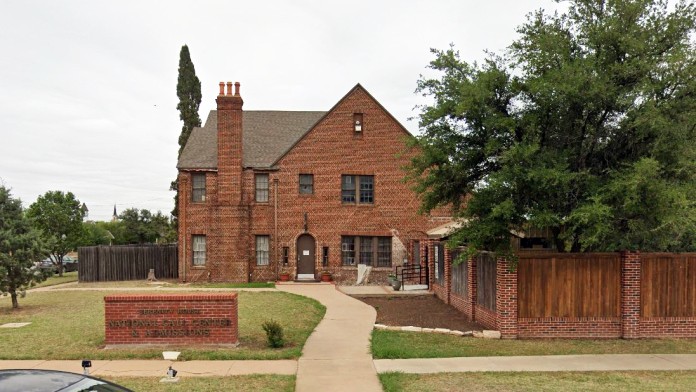
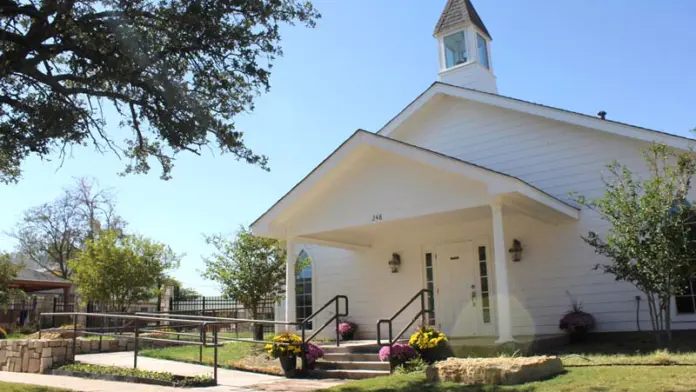
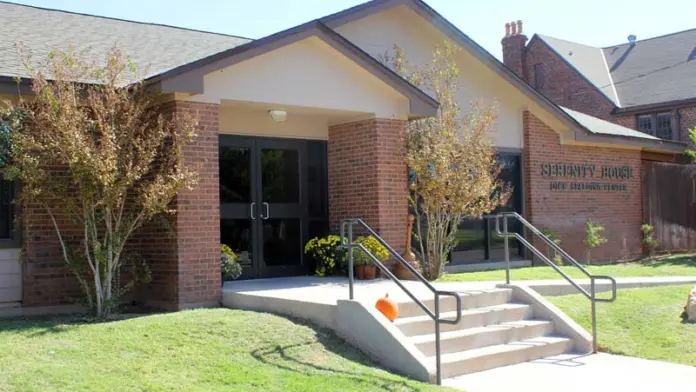
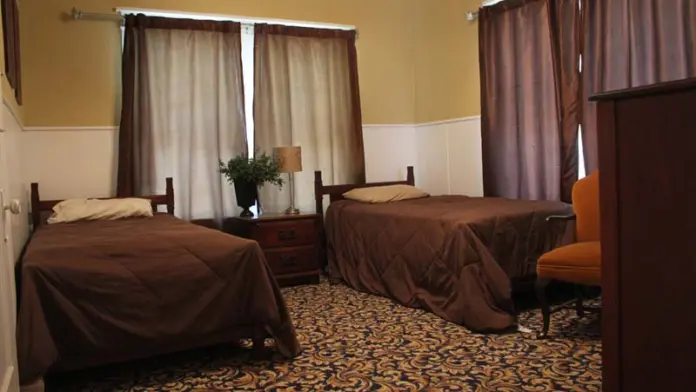
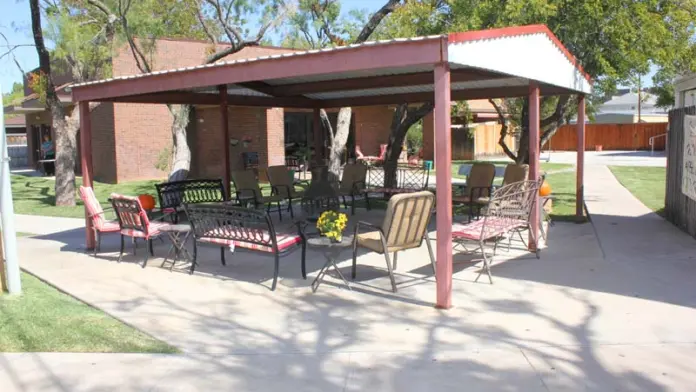
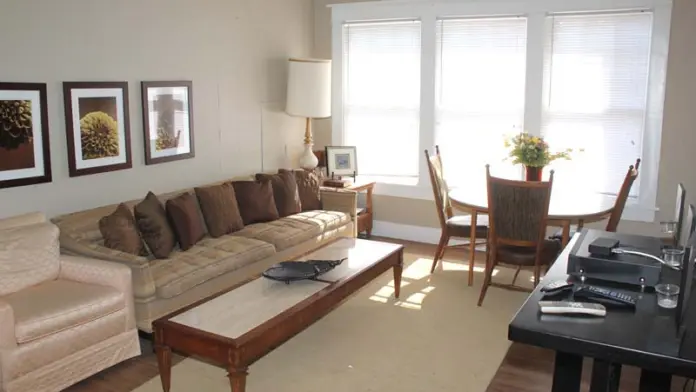
Location
Accepted Insurance
Other Forms of Payment
Private insurance refers to any kind of healthcare coverage that isn't from the state or federal government. This includes individual and family plans offered by an employer or purchased from the Insurance Marketplace. Every plan will have different requirements and out of pocket costs so be sure to get the full details before you start treatment.
Self-pay involves paying for treatment out of your own pocket. You can use savings or credit, get a personal loan, or receive help from family and friends to fund your treatment. If you don't have insurance or your insurance plan doesn't cover a specific program, self-pay can help ensure you still get the care you need.
Financial aid can take many forms. Centers may have grants or scholarships available to clients who meet eligibility requirements. Programs that receive SAMHSA grants may have financial aid available for those who need treatment as well. Grants and scholarships can help you pai for treatment without having to repay.
Medicaid is a state based program that helps lower-income individuals and families pay for healthcare. Medicaid covers addiction treatment so those enrolled can use their coverage to pay for rehab. When a program accepts Medicaid the client often pays very little or nothing out of their own pocket.
Addiction Treatments
Levels of Care
Treatments
The goal of treatment for alcoholism is abstinence. Those with poor social support, poor motivation, or psychiatric disorders tend to relapse within a few years of treatment. For these people, success is measured by longer periods of abstinence, reduced use of alcohol, better health, and improved social functioning. Recovery and Maintenance are usually based on 12 step programs and AA meetings.
During rehab in Texas, you'll deal with underlying issues that contribute to addiction. By addressing these challenges and learning healthy ways to cope with them, you'll develop strategies that help you live a drug-free lifestyle.
Many of those suffering from addiction also suffer from mental or emotional illnesses like schizophrenia, bipolar disorder, depression, or anxiety disorders. Rehab and other substance abuse facilities treating those with a dual diagnosis or co-occurring disorder administer psychiatric treatment to address the person's mental health issue in addition to drug and alcohol rehabilitation.
Opioid rehabs specialize in supporting those recovering from opioid addiction. They treat those suffering from addiction to illegal opioids like heroin, as well as prescription drugs like oxycodone. These centers typically combine both physical as well as mental and emotional support to help stop addiction. Physical support often includes medical detox and subsequent medical support (including medication), and mental support includes in-depth therapy to address the underlying causes of addiction.
Substance rehabs focus on helping individuals recover from substance abuse, including alcohol and drug addiction (both illegal and prescription drugs). They often include the opportunity to engage in both individual as well as group therapy.
Programs


Clinical Services
Cognitive Behavioral Therapy (CBT) is a widely used therapeutic approach that focuses on practical results, achieved through cognitive restructuring and behavior modification. In large, nationwide studies, Cognitive behavioral therapy has been proven more effective for treating substance abuse disorders than the other leading therapies. Cognitive behavioral therapy has a two-fold focus on correcting flawed patterns of thinking that lead to undesirable behavior and in unlearning bad habits and behaviors and replacing them with healthier behavior. Patients and counselors share the load for treatment under this model, making the patient largely responsible for the success of his/her own treatment.
At Serenity House, they know that no one should walk the difficult road to recovery alone. For this reason, each patient participates in daily group addiction counseling sessions. Each patient is unique with unique challenges to recovery, but many of their patients are encouraged to discover that other people can relate to their challenges and have been or are in a similar place. Group counseling is an opportunity for patients to share their deepest struggles and challenges, confront blocks to recovery, personalize information they have received during daily lectures, and provide and receive support along with their fellow patients.
Recovery from drug and alcohol addiction is one of the greatest gifts a person can receive, but the road to that recovery can be a difficult, emotionally turbulent process as you confront the deepest roots of addiction. This is why every patient at Serenity House spends regular, one-on-one time with an experienced, licensed drug and alcohol counselor. Individual recovery counseling is one of the keys to successful recovery. It is where the rubber meets the road for a patient, and they receive the support and encouragement they need to take steps towards recovery.
Since addiction does not just affect an individual, but the whole family, recovery education is also offered weekly for family members to learn about the disease of addiction and the essentials of true recovery. Families learn about the role that they can play in their loved one’s recovery and gain insights into what their loved one’s recovery journey looks like. Then, in family counseling, they have an opportunity to process these discoveries, along with their own personal feelings and experiences.
Nutrition therapy, aka medical nutrition therapy (MNT), is a way of treating physical, emotional, and medical conditions through diet. Specific dietary plans are designed by professional nutritionists or registered dietitians, and patients follow them in order to positively affect their physical and mental health.
Addiction recovery treatment in Texas will offer recreational therapy in a holistic approach to treatment. Therapy incorporates enjoyable activities that support your physical and mental health, such as team sports, creative arts, or individual sports. This activity gives you an emotional outlet, reduces your stress, and improves your mood, each of which promotes long term sobriety.
Amenities
-
Gym
-
Wifi
-
Residential Setting
Accreditations

The Commission on Accreditation of Rehabilitation Facilities (CARF) is a non-profit organization that specifically accredits rehab organizations. Founded in 1966, CARF's, mission is to help service providers like rehab facilities maintain high standards of care.
CARF Accreditation: Yes

The Joint Commission, formerly known as JCAHO, is a nonprofit organization that accredits rehab organizations and programs. Founded in 1951, the Joint Commision's mission is to improve the quality of patient care and demonstrating the quality of patient care.
Joint Commission Accreditation: Yes
Contact Information
1546 North 2nd Street
Abilene, TX 79601







